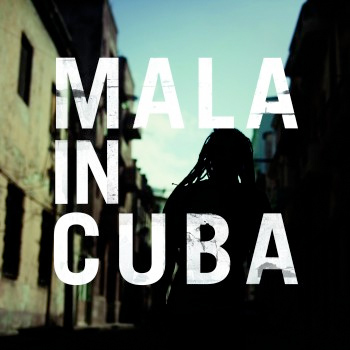Dubstep has now reached such sheer critical mass that even the mad old lady who goes up to you in Greggs has taken to donning a Skrill-cut and a ‘WOB WOB WOB’ t-shirt. But while the rest of us send flowers and quietly discuss inheritance plans, there’s still one place the genre has yet to spread before it truly pops its clogs – the adult listening market. While the teenage mainstream goes big-drop bonkers, it’s the fifty-quid man who remains strangely impervious to dubstep’s irrepressible force. But let’s not deny the inevitable here; it’s only a matter of time before halfstep beats and rumbling subs are scumbled and sanitised for the Kirstie Allsop set, doomed to piddle out over restaurant tannoys and daytime TV shows until the genre’s dying days.
Quick roundup: Renowned dubstep producer and DMZ label head gets the call from BBC jazz-world mogul Gilles Peterson to join him halfway round the world, swapping spliffs for cigars and soaking up the Cuban atmosphere. He returns to sunny South London with a hard drive full of samples which he proceeds to mould around the bass-heavy sound he’s been pioneering for almost a decade. You can almost taste the Mercury.
The Gilles Peterson connection, the Buena Vista-esque musical tourism, the distinct whiff of nineties nostalgia pervasive throughout this, his big, serious auteur LP, all suggest a cynical ploy to finally get grown-ups into dubstep. And so, as ivory chords are poured like M&S double cream over a bed of dry congas on the intro track, we can almost hear our mothers saying “This is quite nice, can you put it on a tape for me?”
Whither Mala? With his kingdom annexed to a hinterland run wild by cross-genre eclecticists and EDM thugs… Perhaps this is the right time to ease back and embrace the world of ethnic home furnishings and be-socked sandals. Or maybe not.
There are certain moments on Mala In Cuba that are nothing short of thrilling; tracks which, played at the right volume (and by ‘right’ I mean fucking LOUD), would easily sit at the forefront of any decent DJ set. ‘Curfew’ sees the Digital Mystik on top form, an echo-decked piano salsa giving way to a cochlea-rattling single note stomp. ‘Changuito’ is an insidious lurcher goaded on by a frantic pitch of congas. And when those horns blare through – well, just you wait.
All said, Mala In Cuba is too dark and complicated an album to warrant the "coffee table dubstep" tag some may wish to throw at it. In some ways it could be seen as a 2012 analogue to Reprazent’s New Forms, the pivotal 1997 drum & bass double-album whose use of live jazz-inflected instrumentation worked as a lighter antidote to the dominant jump-up and tech-step styles of the time. New Forms garnered praise from longtime d&b heads and viewers of Jools Holland alike, but in doing so it also unwittingly showcased drum & bass as a middlebrow marketing commodity. It wasn’t long until knock-off jazzy-schmazzy breakbeats became the de rigueur wallpapering soundtrack for a thousand home improvement shows (along with Latin jazz of course), and in only a couple of years innovation in the genre was largely seen to wane.
So, perhaps not so much coffee table dubstep as the album that potentially brings dubstep to the coffee table. I can get with that. There’s just one factor that stops it being a true contender to New Forms. One thing that stops me from truly loving it…
The fundamental problem with Mala In Cuba is that he simply doesn’t seem at home in this setting. Mala had problems in the early writing stages of the album, his initial excitement for the raw material giving way to near abandonment of the project. This frustration sadly shows through here. Stylistic incongruities can often lead to interesting new musical fusions, but in this case the two elements aren’t always so easily compounded. Rather than basing tracks around whole bars or passages, Mala chooses to cut his field recordings into the tiniest of flourishes, often resorting to single notes and drum hits as he crowbars them into his trademark 140bpm tempo.
On ‘Tribal’, a single diminished piano chord rings out like a dub-echo diving bell while rigidly-programmed conga and timbale patterns cycle around in claustrophobic little loops that don’t allow for that natural groove and swing you’d expect from an album made with a full Cuban band. It doesn’t help that a lot of Mala’s samples sound, well, like samples – close-mic’d, straight out the box, with a lack of essential space and dust that could have made this a truly successful hybrid. As such, the less inspired moments on this album really drag it down. A would-be barnstormer, ‘The Tunnel’ instead suffers from a truly unimaginative mid-frequency bassline that outstays its welcome in less than two minutes before giving up in favour of an even duller one, this time punctuated by stiff little piano stabs. The album is at its best when samples are twisted and shaped into radically different sounds – the aforementioned trumpets-turned-war horns on ‘Changuito’ being a prime example. But it beggars reasons for the excursion to Cuba in the first place when a regular electronic album would have produced similar ends.
Mala In Cuba sounds very much like the work of someone who recorded a Cuban band and then went home to see what he could make of it. What we end up with is a fairly decent dubstep album with Cuban samples sprinkled on top. A more collaborative approach, working with band leader Roberto Fonesca with a joint aim in mind, could have saved this from being more than a good opportunity that falls short of the mark. As such, we’re left in a contextual interzone, not so much transported to the island of Cuba as made to watch a holiday programme about it while sitting in the lounge area of a London studio.


